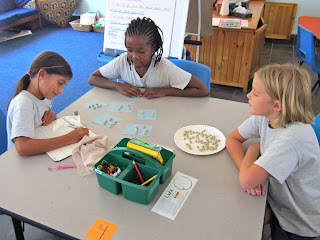As we were reading, I posted "What if...?" questions and the students loved it. For example, I asked questions such as "What if you saw 10,498 lions while on safari?" or "What if you ate 9,207 kernels of popcorn?"
After the book, the kids got to create their own "What if...?" sentences with large numbers. Check out their questions!
What if...
… you had 1,000 boxes of ice creams? Jescah
… you ate 9,846 cookies? Adrienne
… you had one million dogs? Vansh
…a there was 607,896 air in the world? Tanay
…there were 100,000,000,000,000,000,000,000,000,000,000,000… students in the school? Christophe
… there were 900,000 fruit flies in the class? Travis
… there was a googol children in a 4X4 meter room? Luka
… 77,777 spiders were born in one egg? Zoey
… you had 88,888 million bunnies? Noelle
… 9,000 people made trucks? Elrad
… you had googol pets? Evan
… 9,640 of your friends each had 7,000 kids? Magali
… everyone had an octillion chocolates? Stan
… you had 10,000400 dog? Tristan
… you have 99,999 toys? Elin
… there was 7,504 hats on each person? Maiya
… you had 100,000,000 pets? Alma
… you had 100,000,000,000,000,000,000,000 dollars? Ethan
… you wore 1,000 t-shirts? Meet
Check out the book with your class and post your own "What if..." questions below?





